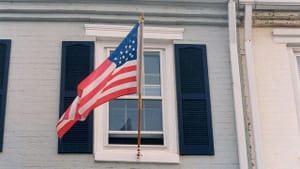Stay in the Loop
BSR publishes on a weekly schedule, with an email newsletter every Wednesday and Thursday morning. There’s no paywall, and subscribing is always free.
Thoughts on patriotism in the wake of the Paris attacks

On 9/11, on that Tuesday in 2001, the first thing I did was to put up the American flag. I went into the coat closet, fetched it, went out on the porch, put the staff into the holder, tightened down the knob, looked at the flag hanging there for a minute, and went back inside. I left it there for 11 years. I asked myself often in the days following 9/11, and then in the ensuing weeks and months and years, if I should take it down. The answer was always “No.” Eventually, though, one day the answer came back, “Okay, that’s enough,” and now it’s back to flying on holidays.
Sibelius’s Finlandia, Copland’s Appalachian Spring, and a new work by Hannibal, One Land, One River, One People were on the Philadelphia Orchestra program Saturday evening. But the concert opened with an unscheduled piece, “La Marseillaise.”
Because of the terrorist attacks in Paris the day before, concerts everywhere included the French national anthem. Whether it’s a natural calamity that devastates, like a tsunami hitting Japan, or a proclaimed and common enemy that attacks, like the Islamic State, we look for ways to unite with others in their grief.
Skip the national anthem
A couple of weeks ago in the Washington Post, Scott Cantrell expressed his dislike of hearing the national anthem at concerts. I appreciate his sentiment; I don’t think I’d like to hear it at every concert. But every one of his arguments, I believe, is wrong. Concerts are not patriotic displays, he writes, and this is true. But neither is a ball game. There’s no more reason for a patriotic display at a sporting event than at a musical one.
“The Star-Spangled Banner” doesn’t fit with Beethoven and Mozart in a concert, he writes. This may be true (I’m not sure it is, even though our anthem isn’t great music), but the appeal of the patriotic display lies in its dissonance — even its inappropriateness — to its surrounding. “That’s not why we’re there” is correct. But a red, white, and blue flag also clashes with the cream yellow and green trim of my house. The clash is of no consequence; the appeal of both is even enhanced by the jarring.
Is patriotism the problem?
The problem, however, isn’t with patriotic display. It’s with patriotism itself, isn’t it? We can tell, because the word is seldom allowed to stand on its own. Cantrell mentions “perfunctory patriotism” as if patriotism is always a pose, just as he mentions “narrow nationalism” as if nationalism is always jingoism.
But when I think of nationalism, I first think of that Sibelius Finlandia or of Copland’s Appalachian Spring, of Borodin and Grieg and Ives and Vaughan Williams and Bartók. I think of all the composers in all the countries who looked for, and found, and created their own country’s voice. Many times this nationalism sprang up to break the 19th-century hegemony of German training that ruled classical music. But whatever the reason, it advanced a love of country, and behind it, a love of liberty, which is after all what the “Marseillaise” or the “Hymn to Liberty,” is.
But doesn’t patriotism go beyond this?
Too much of a good thing?
Certainly it can feed into domination or tyranny or imperialism. But any good thing can be turned. Macbeth shows that even the love of one’s wife or husband can be ill-used. Loving your mother can be perverted, according to Psycho. But the love of mother, spouse, and country are good things. I don’t love America and my family because they’re good (I happen to think they are) but because they’re mine. I don’t therefore hate France or Finland or somebody else’s family; it’s not either/or. Rather, my love of country and family opens me up to all countries and to all families, because it opens me up to love.
True, it means that I’ll defend what’s mine. I haven’t lived in New Jersey for 40 years. But that’s where I’m from; I’ll always be a Jersey kid. I can make jokes about New Jersey, but, as a bit of doggerel I wrote explains,
The Barrens, gardens, suburbs, speak—
Along with beaches stretching wide,
Along with roads on which you ride—
And by themselves defy your cheek.
They don’t require, for all your fun,
Defense from me at what you spoke.
But try your lame New Jersey joke
On me; let’s see how much you laugh when we are done.
Flying many flags
Driving up Fifth Street, into Hunting Park and north, I see flags of Puerto Rico flying from cars. Pennsylvania is one of 19 states requiring just a rear license plate, so it’s not uncommon here to see Irish, Italian, German, U.S., and other flag plates on the fronts of cars. Those flags, of whatever country, are the emblems of American patriots, because anyone who loves any country that much knows what patriotism is, and will love this one, too.
I just finished a work called Grandmother’s Garden for the Settlement Music School Children’s Choir, to be sung next spring. The children’s book by John Archambault says that all of us — roses, carnations, whoever we are — grow in one garden. The rain falls and the sun shines on all of us together. Then it says this:
José from Mexico, Celine from France,
David, Mohammed, Sarah, and Hans,
Stanley, Tyler, Michael, and Collette,
Sergei, Kevin, Keiko from Japan,
In Grandmother’s garden, we are all one.
I love that José is from Mexico and that Celine is from France. That pride is real; that pride is good. I will stand during their national anthem any day of the week. There is no time clock on patriotic display or on grief. National pride is not the enemy of the oneness we hope for. Patriotism is the very ground of unity.
Editor’s note: I am reminded of the scene in Casablanca — you know the one.
For a response by Rick Soisson, click here.
Sign up for our newsletter
All of the week's new articles, all in one place. Sign up for the free weekly BSR newsletters, and don't miss a conversation.

 Kile Smith
Kile Smith